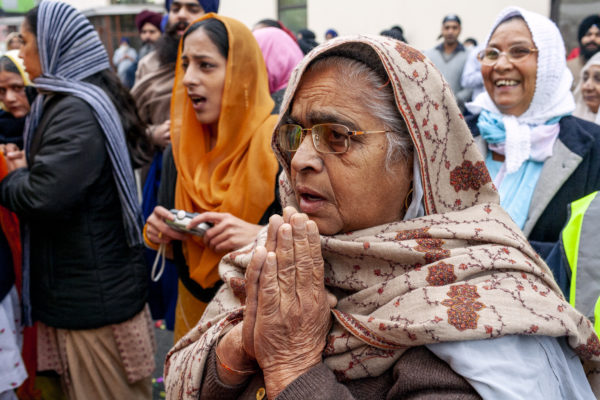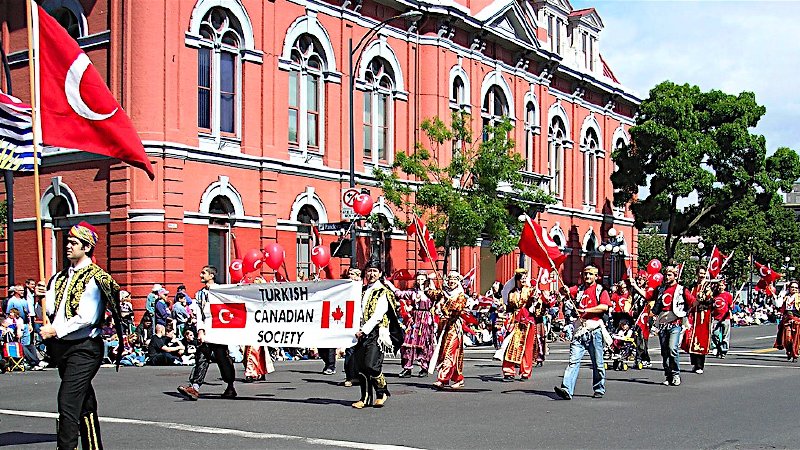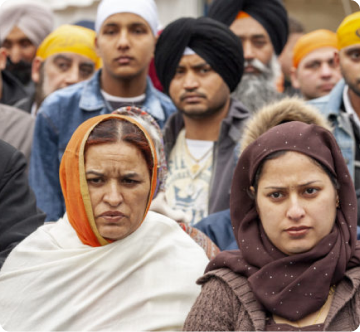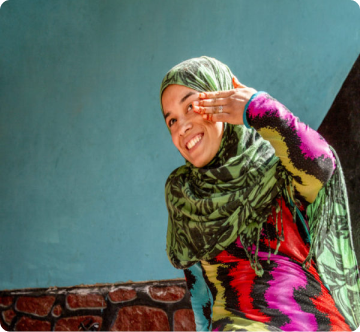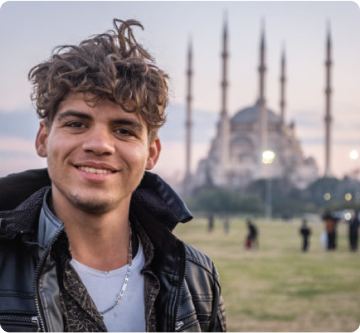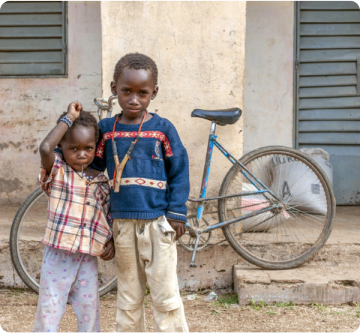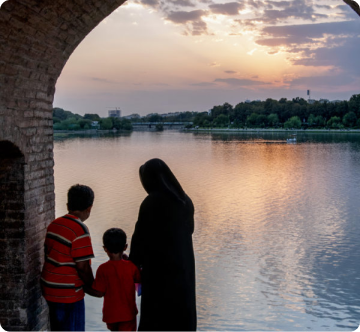Quick Facts
Place of Origin: India (Punjab State in the far north).
Primary Language: Punjabi
Secondary Languages: Hindi, English
Religion: Sikh (primarily Chamar and Jat) (70%); Hindu (28–29%); Christian (1–2%)
Population: 25 million
Founder of Sikhism: Guru Nanak
Date Founded: Late 15th / Early 16th century
Holy Book/Text: Guru Granth Sahib
Holy Site: Golden Temple in Amritsar, India
What are Punjabi Sikhs' lives like?
- Seriously committed Sikhs do not drink alcohol. However, one of the painful truths for some Sikhs in Calgary is a serious drinking problem.
- Many Sikh men work very long hours and time with their wives is very limited, sometimes leading to serious emotional distance between them. Also, there is often tension between multiple generations of Sikhs living under one roof.
- Sikhs are typically very hard workers and thrive in multiple job sectors, including real estate, trucking, law, healthcare, auto-repair, and more.
- Sikhs are a very proud people with deep feelings that occasionally come out in the open. They have a protective warrior mentality much due to their history of being persecuted.
- Sikhs, especially older individuals, have a tendency to not assimilate into the wider Canadian culture and tend to keep to their own cultural community.
5 Days of Prayer for Sikhs
Perhaps you recognise Sikhs in your community by the distinctive symbols they frequently wear. Maybe you work with Sikh people and live near them. Or perhaps you know nothing of their beliefs, but you want to understand more and include Sikh people in your prayers.
Five Days of Prayer for Sikhs is a clear and interesting prayer guide to help you pray for Sikh people while exploring their faith, their culture, and their needs and concerns. Learn about them and practice the love of Christ through prayer for Sikh people by taking five days to pray for them using World Prayer Guides' Five Days of Prayer for Sikhs. An excellent resource for your family, church or study group.
What do Punjabi Sikhs believe?
- Sikhism was founded by Guru Nanak in the 15th century. Sikhs are monotheistic, believing in one God who they call Waheguru (“wonderful lord”).
- Many Sikhs also believe in reincarnation. To oversimplify, the goal of ‘salvation’ as understood in Sikhism is the soul becoming one with God. This can be achieved by following the principles of Sikhism and meditating on the Sikh scriptures.
- Although some identify influences from Hinduism and Islam in the development of Sikhism, this is rejected by most Sikhs and would be an insult to imply this is the case.
- In 1699, the last of Sikhism’s 10 human gurus appointed their scriptures (Sri Guru Granth Sahib) as the final guru. Sikhs consider the Granth Sahib to be the eternal, living guru and thus to be treated with utmost respect.
- The Golden Temple in Amritsar, Punjab, is considered the ‘Jerusalem’ or ‘Rome’ of Sikhism.
- Sikhs are the largest unreached people group in Canada. Sikhs will tell you that they respect and even love Jesus as a great teacher, but Jesus is for westerners, Muhammad is for Muslims, and Guru Nanak is for the Sikhs; all religions lead to God, and Sikhism is the way to God for Sikhs.
- A majority of Sikhs are ‘nominal’ in terms of full religious observance but will still claim Sikhism as their religion.
- Sikhs are monotheistic but believe that God can be approached or attained via multiple religious avenues as long as an avenue is monotheistic—people from other faiths are not to be converted because they view all monotheistic faiths as of the same God.
- Sikhism flourished historically because of the number of people opposed to Islam and Hinduism.
- Sikhs want to always focus their minds on God (Waheguru, or wonderful teacher) who is fearless, unconstrained by time/space, is not or ever will be human, was not born, and will never die.
- God is without form, infallible, imperishable, immortal, and indescribable, loving everyone as much as possible, even at the moment of death.
- Many Sikhs believe in reincarnation.
- Sikhs value service to humanity, equality of human life, and faith in one omnipotent God.
- Sikhs are to be spiritually/physically disciplined and do acts of charity/compassion, work hard, live honestly, avoid selfish desires, and believe in one omnipotent God.
- The final goal of a Sikh's life is to be united with God. Some believe in heaven/hell.
- Sikhs have a history of martyrdom and suffering for their beliefs. The final human guru, Gobind Singh, declared before his death that the Guru Granth Sahib, Sikhism’s holy book, is alive and that the Guru’s spirit is in the Granth and the community (Khalsa) of at least five gathered pure (initiated) Sikhs.
- Sikhs gather and worship in a temple known as a gurdwara (door to the guru), usually sparsely furnished without altars, statues, or idols. Gurdwaras are generally open to the public and serve free daily communal meals around the clock.
- Sikhs reject religious rituals, animal sacrifices, pilgrimages, or fasting.
- Sikhs adhere to the significance of what are called the 5 K’s:
- Kesh – uncut hair (men wrap theirs in a turban).
- Kanga – a wooden comb to hold the hair.
- Kara – an iron bracelet to remind them to do good.
- Kachera – a long cotton undergarment that promotes modesty and self control.
- Kirpan – a small sword kept at the waist, to be used only in self defense or protecting others.
- Worship consists of mainly Sikh males reading the holy book (Guru Granth Sahib) in 2-hour shifts, with worship music sung to by worship leaders using instruments called a tabla and harmonium.
- Males/females sit separately on the carpeted floor in the worship hall listening, meditating, praying, sometimes reading small portions of the Guru Granth Sahib, giving offerings, and receiving Karah Parshad—a sweet made with equal portions of whole-wheat flour halva, clarified ghee butter, and sugar, and which is usually given into cupped hands with a napkin.
- Sikhs are supposed to read five verses from their holy book daily and pray five times daily.
- Sikhs cover their heads and remove their shoes inside the gurdwaras. They bow before their holy book in any gurdwara room in which it is kept.
- Money offerings are left in front of the holy book, and grocery offerings are made in bins or barrels in the gurdwara langar (communal dining hall).
Festivals
- Vaisakhi festival in April celebrates both the South Asian New Year and the founding of the Khalsa society (the community of those who members of the Sikh faith), inaugurated by the 10th guru in 1699. The largest Vaisakhi parade in the world is held in Surrey with up to 500 thousand (pre-Covid) attending.
- Diwali (Festival of Lights), also celebrated by Hindus, and other South Asians, is observed in November.
- Sikh Heritage month is held each April in Canada. Events are specific to each community and can be found online. In BC the website is https://www.sikhheritagebc.ca/
Punjabi Sikh's Story in Vancouver
- Sikh people started immigrating to Canada – another part of the British empire – in the late 1890s, attracted initially by agriculture and forest industries similar to their homeland in northern India.
- The Komogata Maru incident occurred in 1914 when a ship carrying Sikh and other South Asian immigrants was refused landing rights in Vancouver, and many died enroute back to India and upon arrival. Some ministers of Christian churches at the time wrote letters to the editor supporting the blockade of the Sikh immigrants, and this stain remains a living memory in the Sikh community to this day. (Source: https://www.thecanadianencyclopedia.ca/en/article/komagata-maru or https://canadiansikhheritage.ca/komagata-maru/) The Government of Canada issued an apology in 2016, but the Christian community has yet to reach out to the Sikh community to ask for forgiveness.
- A significant wave of immigration followed the 1984 Golden Temple incident (Source: https://www2.gov.bc.ca/assets/gov/british-columbians-our-governments/our-history/historic-places/documents/heritage/sachp_context_study-final.pdf) and subsequent Indian government persecution of a separatist element within Sikhism.
- Immigration has increased as Canada is perceived to be a welcoming and safe country of opportunity. More and more Sikhs are coming as international students and most plan to stay in Canada upon graduation.
- As of 2018 (pre-Covid), there were 138 thousand international students studying in BC; 34% were from South Asia, and most of these were from Punjab. International students are projected to increase post-Covid.
- Punjabi-Sikh people are well-integrated into Canadian society at every level, in spite of having experienced significant discrimination, including discrimination from Christian churches. British Columbia has had a Sikh premier (Ujal Dosanjh), and currently has 5 Sikh members of Parliament.
- As an immigrant community, Sikhism acts as ‘cultural glue’ to the Punjabi community, that helps to provide a sense of community identity.
- Sikh people are well-integrated into every profession, occupation and level of society. It is likely that every follower of Jesus knows a Sikh person or has a Sikh friend, neighbor or colleague.
- Sikhism is egalitarian in terms of male-female roles but in practice may be more patriarchal. Hard work, industriousness and self-sufficiency are values promoted by Sikhism, and generally it is a financially well-to-do community.
- Sikhs are very friendly and generous in helping other people, providing free meals (langar) through their gurdwaras, and responding beneficently to humanitarian crises. A recent example is the Sikh response to BC’s flooding disaster in Fall of 2021. https://vancouversun.com/news/local-news/the-massive-volunteer-effort-that-helped-save-lives-and-christmas-in-a-year-like-no-other
Where do Punajbi Sikhs predominately live in the Lower Mainland?
- The population of Sikhs in BC is estimated to be about 275 thousand, not including many thousands of international students studying in BC.
- There are 30+ towns and cities in BC that have a gurdwara (gurdwara is the Sikh temple--that means “door to the guru”), indicating that Sikh people live and work and participate in just about every community.
- Surrey BC is home to the largest community of Sikhs in the world, outside of Punjab.
- About one third of the city of Abbotsford is Sikh.
Pray for the Punjabi Sikhs in the Lower Mainland
Dear God,
Odio felis sagittis, morbi feugiat tortor vitae feugiat fusce aliquet. Nam elementum urna nisi aliquet erat dolor enim. Ornare id morbi eget ipsum. Aliquam senectus neque ut id eget consectetur dictum. Donec posuere pharetra odio consequat scelerisque et, nunc tortor.Nulla adipiscing erat a erat. Condimentum lorem posuere gravida enim posuere cursus diam.
More Prayer Items
- Zechariah 12:10--"And I will pour out on the house of David and the inhabitants of Jerusalem a spirit of grace and supplication. They will look on me, the one they have pierced, and they will mourn for him as one mourns for an only child, and grieve bitterly for him as one grieves for a firstborn son." Pray that the Lord would pour out his Spirit on this community, that they would have a spiritual hunger that only can be satisfied in Jesus
- John 6:44 - "No one can come to me unless the Father who sent me draws them, and I will raise them up at the last day."
- John 16:8 - "When he comes, he will prove the world to be in the wrong about sin and righteousness and judgment"
- Pray that Sikhs would come to see Jesus as the ‘True Satguru’ (the ‘Ultimate Guru’)
- Pray that God would bring at least one gospel-centred believer into the life of each Sikh person, who would look for ways to authentically serve that person.
- Pray that followers of Jesus would respond in obedience to Jesus’ command to share his love with Sikh friends and neighbors by first becoming an authentic friend who will patiently ‘learn, look and listen’ to their cultural worldview before sharing. 1 Peter 3:15-16 - "But in your hearts revere Christ as Lord. Always be prepared to give an answer to everyone who asks you to give the reason for the hope that you have. But do this with gentleness and respect. keeping a clear conscience, so that those who speak maliciously against your good behavior in Christ may be ashamed of their slander."
- Pray that Christian churches would recognize that God has brought Sikh people next door to them and then act accordingly in obedience. Acts 17:26-27 - "From one man he made all the nations, that they should inhabit the whole earth; and he marked out their appointed times in history and the boundaries of their lands. 27 God did this so that they would seek him and perhaps reach out for him and find him, though he is not far from any one of us."
- Pray for the thousands of Sikh-background post-secondary students, including international students, for God’s help with financial pressures, and adjusting to Canadian society.
- Pray for those seeking to reach out to international and post-secondary students with the Gospel.
- Pray for Sikh families experiencing domestic stress of various sorts; for outreach specifically to Punjabi women who often are more open to hearing the Gospel.
- Pray that God would reveal ‘persons of peace’ to those seeking to share the Gospel with Sikhs (Luke 10:5 - “When you enter a house, first say, ‘Peace to this house.’")
- Pray for the few Sikh Background Believer (SBB) congregations that exist in this area (Abbotsford, Surrey, Vancouver).
- Pray for planting of new SBB congregations within the next two years.
- Pray for the development of evangelism materials appropriate to Sikh culture and worldview.
- Pray for the Punjabi Bible revision project, for efficiency and accuracy; for transformation in Vancouver-area Punjabi families as they read the Bible.

